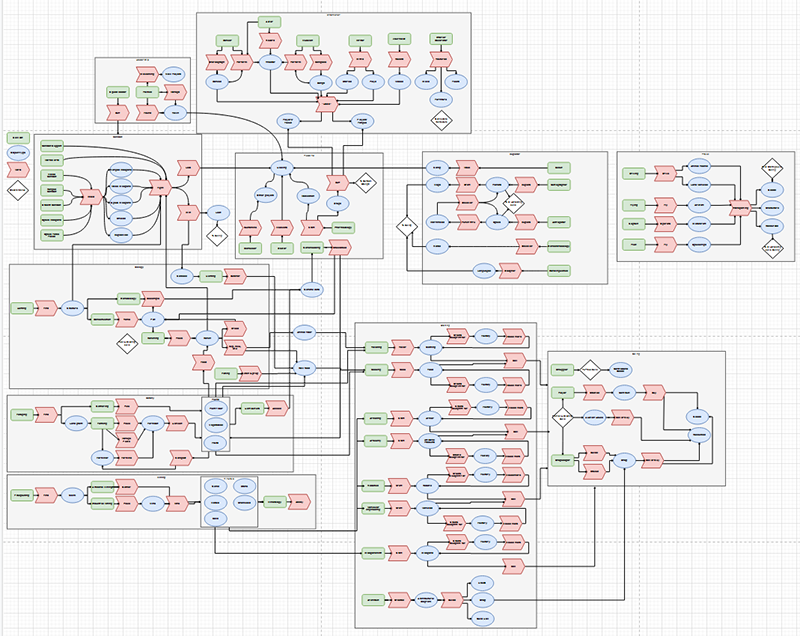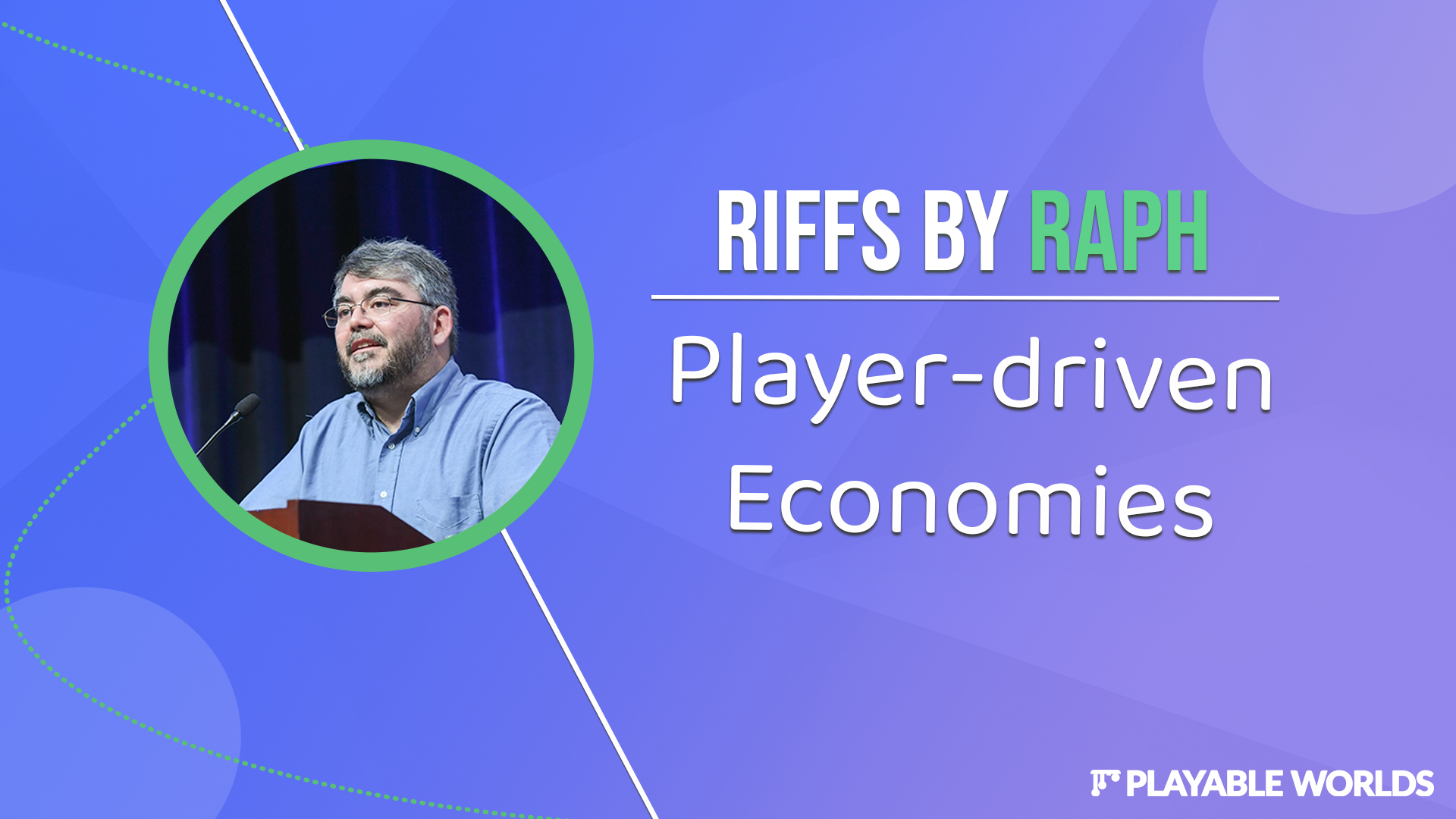Here at Playable Worlds we want to build online worlds where you can play in many ways, and that actually feel like real online communities.
What does it take to get there? Well, if you look at how online worlds have evolved, they seem to have fallen into a few templates.
There’s the “oldschool” way, where you need to build a team of highly trusted fellow players who practice together and play together regularly, often for long sessions that are hard to schedule… and the game is pretty much kill loot upgrade your killing kill kill kill.
Or there’s the “play alone together” model, where players basically solo their way through a series of quests, each running on parallel tracks, seeing each other, but rarely mutually dependent. Usually, you run out of the tracks the developers laid, and the game abruptly shifts to one of the other kinds.
Lastly, of course, there’s the “kill everyone that moves” version… we’re not interested in building a “gankbox,” as some call it, so I won’t dwell on that one much!
None of these particularly caters to the full range of players who are vital to an MMO’s success: the ones who spend hours writing strategy guides, the ones who map every inch of the world, the ones who roleplay and give the world its color, the ones who do all the emotional labor of keeping guilds running… you know, the players who make the world come alive.
In fact, the game basically punishes those players by omission! Time spent doing those incredibly valuable things is time not spent popping XP bags for levels or collecting the six foozles for your latest quest giver. And that means these players fall behind their friends.
We believe that players should not have to choose between a team game and a solo game with other people around. We shouldn’t have to pick between worlds that are only about combat and worlds that are basically giant narrative quest chains.
I don’t really know my plumber well. I’ve never invited him to my birthday party. He has never had me over to dinner. I know his first and last name, but none of his secrets. I mean, I won’t ask my plumber to help me bury a body, but I trust him not to flood my house!
And yet, the relationship I have had with this plumber is longer than some working relationships I’ve had, longer than some friendships I have had. It’s an important connection, because when I need the help of a plumber I trust, I know who to call.
Weirdly, the reason why I have that level of trust in him is because I pay him.
Psychologists have studied the levels of trust and intimacy – and we can use these for game design! Gankbox games are worlds of no trust, soloable games are low trust, and team-based games are high trust. But a game made for one narrow band of the human experience is inevitably going to burn its players out for one reason or another.
What is crucial is being able to move up and down that ladder, and for that, you need systems that enable and encourage different levels of relationship. And for millennia now, real human societies have used an invention called “currency” for that.
Money is a way to bridge the trust gap between you and someone you don’t really know – like the clerk behind the counter at a store – and someone you come to know and appreciate, like my plumber, or Sarah, my barista at my local coffee shop, who always gives me a smile and asks after the family when I stop by (which is rarely in these pandemic days).
That’s how humans come to trust one another. First it’s a service offered, a bargain completed, the service rendered and a payment made. Eventually it’s a smile, and the gift of a cookie with your coffee, or the willingness to fix a toilet on a Sunday night. Sometimes, you really do make friends, and for all I know, you bury bodies together on the weekends.
These levels of connection are called “strong ties” and “weak ties” in sociology, and science says that strong ties keep us happy and healthy and sane – but weak ties make us successful and valued and get us jobs. In fact, if you stop to think about it, a big ol’ network of weak ties is just another way to think of the word “civilization.”
When I think about it that way, it makes me extra-sad that so many MMOs won’t even let you drop a thing on the ground, won’t let you give someone a gift of a hand-me-down item.
OK, enough lofty theory stuff. Let’s get concrete. See this picture?

That is the map of the economy of our game.
It shows the ways to play that we will have on offer. And every one of those ways to play will turn into something that you can sell, or a service you can offer, and charge other players for. It might be stuff you can mine. It might be goods you can craft from that stuff. It might be transporting those goods. Selling them from a shop. Fixing them. Entertaining people. Roleplaying. Mapping. Interior decorating. Even things like running a guild or helping a newbie or doing great streams on Twitch.
All of those should be seen by the game. You should be able to advance in any of them. And you should be able to sell that expertise and that passion.
Why? Because then you become that plumber someone trusts. That barista that people get to know at the corner coffee shop, who always has a kind word. You become the person who is an important piece of glue in the community, helping hold the online society together. And at some point, if you are lucky, you become friends.
The player who loves a tight-knit team needs that tinkering crafter. The crafter needs that corny roleplayer. The roleplayer sometimes even needs that gankbox fan. Because it takes all sorts to build a world and a civilization.
This often all gets boiled down to the phrase “a player-driven economy.” And people think it means revenue models and monetization. Maybe, if they are savvier about online worlds, they think it means players make the items that other players play with – and that’s true, they can and do and should! But even that is still a reductionist way to think of it.
A player-driven economy isn’t about the money. It’s about having every way to play the game serve a role in the ecosystem. It’s about all the wonderful and weird ways we choose to live and play, and how we find out that our silly hobbies are vital necessities to someone else.
In the end, it’s about making everyone important. Because we all are. Important. Plumbers, baristas, roleplayers and raiders.
The key word in “player-driven economy” isn’t economy. It’s player. It’s you.
Want to join in on the conversation?** Follow us on Twitter.**


